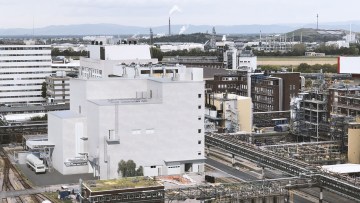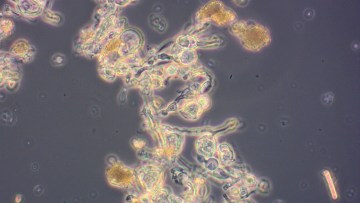Germany
October 12, 2023
- Investment in the high double-digit million euro range
- Strengthening the portfolio of biological and biotechnology-based crop protection products
- Further step in the transformation of production processes in Ludwigshafen
 3D-Modell der Fermentationsanlage für biologische und Biotechnologie-basierte Pflanzenschutzmittel Pflanzenschutzprodukte in Ludwigshafen. Foto: BASF SE
3D-Modell der Fermentationsanlage für biologische und Biotechnologie-basierte Pflanzenschutzmittel Pflanzenschutzprodukte in Ludwigshafen. Foto: BASF SE
BASF invests a high double-digit million euro amount in a new fermentation plant for biological and biotechnology-based crop protection products at its Ludwigshafen site. The plant will manufacture products that bring value to farmers including biological fungicides and biological seed treatment. BASF also plans to utilize the plant to produce the main building block of Inscalis®, a novel insecticide derived from a fungal strain. Commissioning is planned for the second half of 2025. The plant will employ 30 people in production, logistics, engineering and maintenance.
The plant will use microorganisms to convert renewable raw materials such as glucose into the desired products – a process known as fermentation.
“We see a growing demand for biological crop protection products. This investment is an important step in building an even stronger and more competitive portfolio in this area,” said Marko Grozdanovic, Senior Vice President, Global Strategic Marketing at BASF Agricultural Solutions. “In addition, fermentation is a very flexible technology that will allow us to bring more innovative biotechnology-derived products to the market in the future.”
“For production at our Ludwigshafen site, this development is another step in the transition to innovative manufacturing processes with lower energy intensity based on renewable raw materials,” said Christian Aucoin, Senior Vice President, Global Operations at BASF Agricultural Solutions. “The site offers excellent synergies due to its good infrastructure, the integration into an existing high-performance production organization and the proximity of research units such as White Biotechnology.”
BASF baut neue Fermentationsanlage für Pflanzenschutzmittel in Ludwigshafen
- Investition in Höhe eines hohen zweistelligen Millionen-Euro-Betrags
- Stärkung des Portfolios biologischer und Biotechnologie-basierter Pflanzenschutzprodukte
- Weiterer Schritt in der Transformation von Produktionsprozessen in Ludwigshafen
BASF investiert am Standort Ludwigshafen einen hohen zweistelligen Millionen-Euro-Betrag in eine neue Fermentationsanlage für biologische und Biotechnologie-basierte Pflanzenschutzmittel. Die Anlage soll Produkte herstellen, die Landwirtinnen und Landwirte als biologische Fungizide und zur biologischen Saatgutbehandlung einsetzen können. Außerdem plant BASF in der Anlage den Hauptbaustein von Inscalis® zu produzieren, einem neuartigen Insektizid basierend auf einem Pilzstamm. Die Inbetriebnahme ist für die zweite Jahreshälfte 2025 geplant. Die Anlage wird 30 Mitarbeiter in den Bereichen Produktion, Logistik Technik und Wartung beschäftigen.
In der Anlage wandeln Mikroorganismen nachwachsende Rohstoffe wie etwa Glukose in die gewünschten Produkte um – ein Prozess, der als Fermentation bekannt ist.
 Zu den in der neuen Anlage verwendeten Mikroorganismen zählt auch der Pilz Penicillium coprobium, der zur Gewinnung des direkten Vorläufers des Insektizids Inscalis® fermentiert wird. Das Bild zeigt die Pilzzellen in ihrer Fermentationsbrühe. Foto: BASF SE
Zu den in der neuen Anlage verwendeten Mikroorganismen zählt auch der Pilz Penicillium coprobium, der zur Gewinnung des direkten Vorläufers des Insektizids Inscalis® fermentiert wird. Das Bild zeigt die Pilzzellen in ihrer Fermentationsbrühe. Foto: BASF SE
„Wir sehen eine wachsende Nachfrage nach biologischen Pflanzenschutzprodukten. Diese Investition ist ein wichtiger Schritt zum Aufbau eines noch stärkeren und wettbewerbsfähigeren Portfolios in diesem Bereich“, sagt Marko Grozdanovic, Leiter Globales Strategisches Marketing von BASF Agricultural Solutions. „Zudem ist die Fermentation eine sehr flexible Technologie, die es uns in Zukunft ermöglichen wird, weitere innovative biotechnologisch hergestellte Produkte auf den Markt zu bringen.“
„Für die Produktion am BASF-Standort in Ludwigshafen ist diese Entwicklung ein weiterer Schritt bei der Umstellung auf innovative, neue Herstellungsverfahren auf Basis nachwachsender Rohstoffe“, sagt Christian Aucoin, Leiter Globale Produktion von BASF Agricultural Solutions. „Der Standort bietet durch seine gute Infrastruktur, die Einbindung in eine bestehende leistungsfähige Produktionsorganisation und die Nähe zu Forschungseinheiten wie der Weißen Biotechnologie hervorragende Voraussetzungen für diese Investition.“